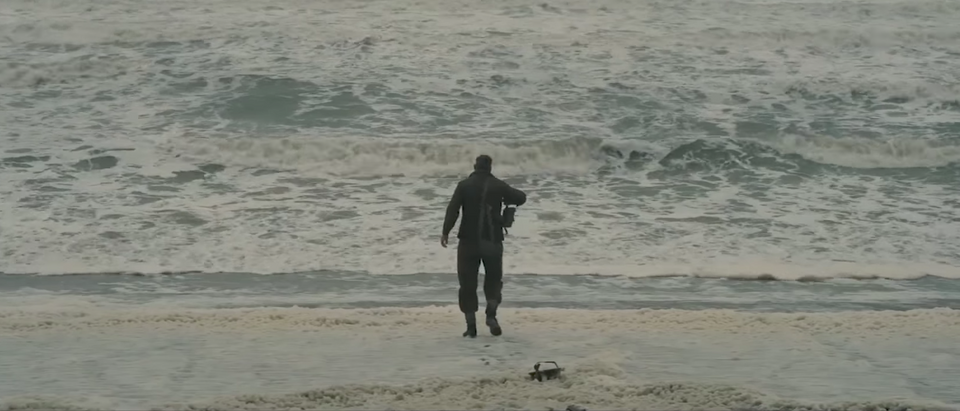Christopher Nolan’s movie “Dunkirk,” out Friday, is not like most war movies. It has no protagonist, characters make decisions without heavy-handed development scenes, and most importantly, there is no victory.
There are lots of reasons the evacuation of 300,000 British soldiers from Dunkirk, France, in 1940 is an unpopular topic for war movies. First, the Allies lost the conflict. There was no clear victory, and the English war strategists, not willing to risk ships and aerial assets in the rescue attempt, had counted the men for dead. Not a shining moment for the British government.
The movie plays more like an exquisitely filmed documentary than summer blockbuster. The action can at times be difficult to track as it covers three timespans simultaneously. The scenes jump from showing parts of the weeklong evacuation of men from the beaches, a single day when thousands of private vessels sailed across the channel to rescue the soldiers, and an hour when a few Royal Air Force planes ran interference against the German Luftwaffe.
The movie shows everything that can go wrong as British forces get walloped trying to exit Europe. It’s an hour and 45 minutes of destroyers tilting over onto hundreds of men who tried to leap free as the boat went under, water pouring into hulls, soldiers trapped inside the metal tomb of a sinking ship.
The movie also captures the high notes of sacrifice and as floating soldiers drenched in oil are pulled at last aboard pleasure yachts and fishing boats, RAF pilots take down planes of the German Luftwaffe in stomach-churning aerial battles.
In the beginning, thousands of men stand out in the open waiting for their turn to board a ship. They scatter and hit the dirt as the Germans drop shells onto the beach, then rise to stand again in line. Just as a ship begins pulling away from the jetty, German planes dive-bomb the surf, and the ship goes down in the harbor.
After watching ship after ship sink from bombs above and torpedoes beneath and seeing countless men crushed by heavy hulls into the suffocating water, soaring with the RAF pilots flying to the rescue seems like relief. That is, until the dogfights begin in earnest and your perspective tilts and twists as one of the pilots (played by Tom Hardy, whose face is obscured by a mask for most of his screen time) whirls through the air.
There are moments of heroism, particularly from one group of civilians who chose to sail their own boat in the rescue attempt and from the RAF pilots, but there are no narrative heroes.
The admiral in charge of the evacuation (played by Kenneth Branagh, who delivers some noble lines but is blessedly, surprisingly, not pompous about it) states Winston Churchill’s goal: Save 35,000 of the 400,000 British boys trapped just a few miles from English soil.
Dunkirk was not a victory. The powers of Britain were trying to salvage a small portion of their army, and the soldiers were in survival mode. Only those who came from outside the fight showed any heroism in the film. It was an impossible situation that forced British war council to make tough decisions and cut their losses.
Throughout the terror and evident death, gore is noticeably absent. This is no “Saving Private Ryan,” and Nolan’s ability to craft the suspense allows you to feel the horror without copious blood. You don’t see close ups of someone’s face getting smashed by a falling turret. You don’t see spurts of blood when the shooting starts. You don’t see boys trying to hold in their guts after the shelling on the beach.
Nolan chose to leave any scenes of Churchill out of the film to avoid being “bogged down in the politics of the situation,” and that decision pays off. While by the end of the movie you struggle to grasp the scale of the 300,000 rescued, Nolan accomplishes his main goal to force the audience to “go through the experience with the character.”
The film also shows the shame of those on the mainland as the rescued soldiers arrive. When the thousands of private vessels deliver the waterlogged soldiers to English shores, the boys march by women and old men on the docks who say “well done,” but can’t meet their eyes.
They know what happened at Dunkirk — they saw the meager air support and the destroyers avoiding the fight for fear of sailing too close to the German U-boats and aerial bombers.
As the soldiers travel inland on trains, they read the papers, the stirring words of Churchill before the House of Commons — “We shall fight on the beaches, we shall fight on the landing grounds …” The papers tell of the unexpected acts of bravery, of a nation coming together to slip thousands of men out from under the German’s nose.
As two soldiers rescued from Dunkirk (one played former One Direction singer Harry Styles) make their way deeper into England, country folk honor them with shouts and drinks. Deep in the heartland, the papers can make Dunkirk, an escape from a muddy strand after a cold and hard retreat, seem like a victory.
Follow Thomas Phippen on Twitter
Send tips to thomas@dailycallernewsfoundation.org.
All content created by the Daily Caller News Foundation, an independent and nonpartisan newswire service, is available without charge to any legitimate news publisher that can provide a large audience. All republished articles must include our logo, our reporter’s byline and their DCNF affiliation. For any questions about our guidelines or partnering with us, please contact licensing@dailycallernewsfoundation.org.


